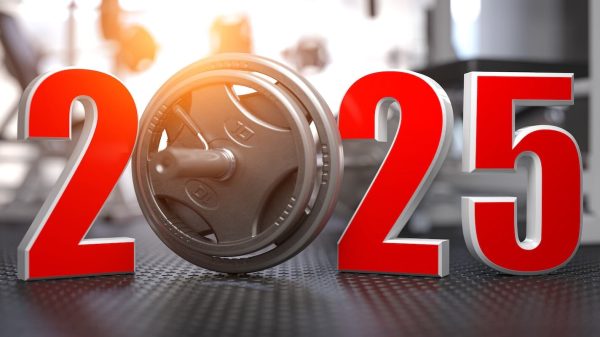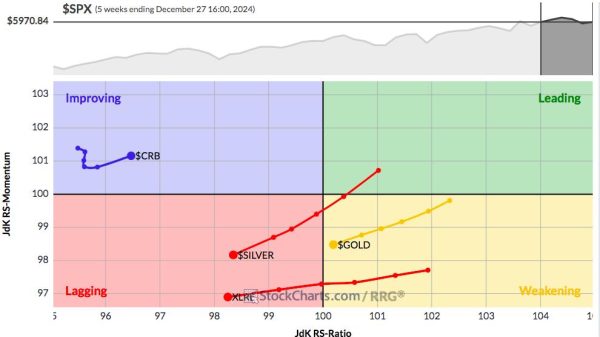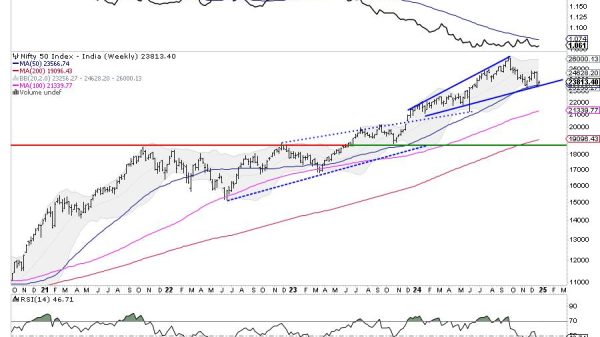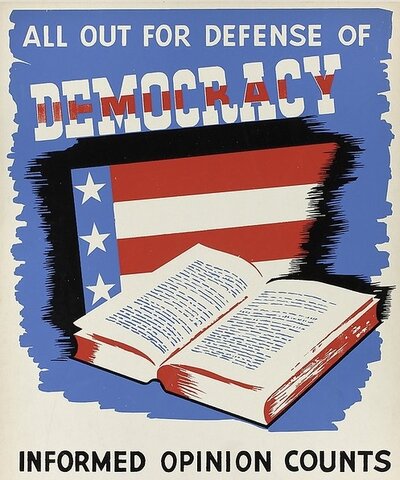Like most libertarians—and most sane Americans—David Friedman looks upon the Trump v. Harris contest with dread:
My opinion of the election is “a plague on both your houses.” Kamala Harris is an extreme representative of an ideology I have opposed for most of my life. Donald Trump has three major positions on two of which, immigration and trade, he manages to be even worse than his opponent. While I have some sympathy for his views on the third [foreign policy], I do not trust him to execute a consistent and competent alternative. His disinterest in whether what he says is true, extreme even for a politician, I find offensive.
…but then comes this confession:
That is my intellectual view of the matter. It is not my emotional view. Reading news stories and observing the effect on my feelings, I note that I am reacting like a Trump partisan. Poll results that look good for him make me happy, poll results that look bad for him make me sad.… If Harris wins I will feel disappointed. If Trump wins I will feel relieved, at least until the first outrageous thing he does.
Many such cases!
David Friedman’s libertarian bona fides should be beyond question (for my money, his Machinery of Freedom remains the best introduction to radical libertarianism). Even so, in some libertarian circles, what he’s let slip—an “emotional” preference for a Trump victory?!—could get you read out of polite company.
As it happens, I think you can make an intellectual case for Friedman’s forbidden feelings. And since I think polite company is overrated, I’m going to make that case here.
To be clear, this isn’t an argument about whom libertarians should root for, much less vote for. Like Friedman, I believe that when confronted with a choice between two people who have absolutely no business being president, sitting it out may be the most responsible option. Instead, it’s an argument about which of two electoral outcomes libertarians should dread more, and it focuses on the administrative state and the courts.*
*I’ve left foreign policy out of this assessment because, like Friedman, I lack confidence that Trump’s occasional paeans to restraints are a reliable guide to what he’d actually deliver.
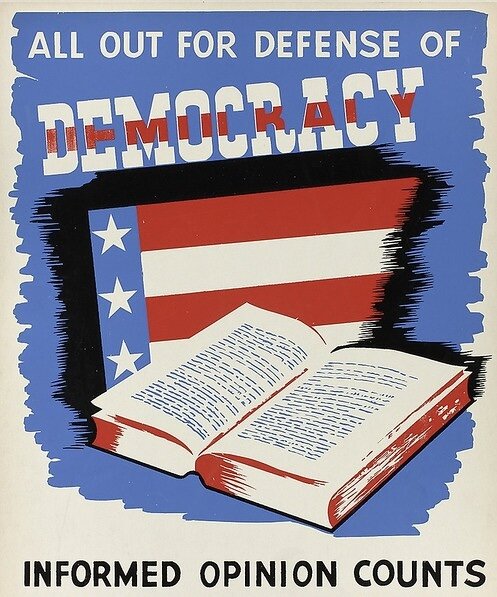
“Our Democracy,” such as it is, has degenerated into a judicial-executive dyarchy. We’re mostly governed by people nobody voted for: bureaucrats and judges. Who gets to be president matters because he or she makes judicial picks, staffs the commanding heights of the regulatory state, and uses “the pen and the phone” either to extend bureaucratic control—or gum up the works. It shouldn’t be that way, but it is.
A Democratic victory on Tuesday means that the party of government retains administrative power and gets four more years to enact its ideological manias on an unwilling public. Because I believe that would be very bad indeed for individual liberty, free markets, and limited government, I can’t pretend to be sanguine about the prospect.
Tapping the Brakes on Administrative Rule
America in the 21st century is “a decaying republic with two emperors,” Ross Douthat observes: in our current regime, “the major controversies get settled by imperial presidents and jurists”: what kind of car you can drive, who gets to use the girls’ locker room, whether or not you’re on the hook for your student loans.
If Trump wins, I don’t hold out hope for deconstruction of the administrative state. But even a holding action against further encroachment of managerial rule would be a major improvement over the status quo. And, on the evidence, a Trump-Vance administration would settle most major regulatory controversies in a more pro-liberty direction than the available alternative.
For instance, new tailpipe emissions restrictions issued by the Biden EPA effectively mandate that the majority of new cars sold in America by 2032 will have to be electric vehicles. Trump promises to repeal the rule, and here at least, there’s reason to take him at his word. Last time around, the Trump administration “rolled back more than 100 environmental regulations,” and managed significant liberalization in other areas.
A Trump-Vance administration will also push back against state-sponsored “wokeness,” for lack of a better term. We tend to think of the identitarian frenzy that’s come over key American institutions as a spontaneous development: bad ideas the kids got from academia and brought with them as they got older. In fact, as Gale Heriot, Richard Hanania, and others have shown, the low-level Cultural Revolution we’ve been living through is downstream from public policy and backed by administrative power.
A Trump-Vance administration would hit “pause” on attempts to use federal largesse to promote DEI “loyalty oaths” in American universities. And it would likely pare back federal attempts to use the bureaucratically concocted concept of “disparate impact” to attack any practice—from school discipline policies to fitness tests for police officers—that disproportionately impacts minorities.
The new Cato Handbook on Executive Orders and Presidential Directives argues that the next president should ban “all statistical measures of discrimination and other disparate impact analysis.” Trump moved to restrict disparate impact late in his last term. The Handbook also calls on the next president to repeal Joe Biden’s first-day Executive Order on Advancing Racial Equity, which makes rooting out “systemic racism” a central organizing principle for the federal government. Trump will do that as well.
The ACLU is apoplectic about the prospect that a second Trump administration will repeal disparate impact, stop the weaponization of civil rights law on behalf of “historically marginalized groups,” and re-impose its “sweeping ban on trainings on race and gender discrimination by federal agencies, contractors, and grant recipients.”
They have reason to worry: lately, the federal judiciary has been pushing in the same direction: toward separation of race and state. The Supreme Court’s 2023 decision in SFFA v. Harvard, curtailing race-based admissions in higher education, presents problems for the DEI Regime on college campuses, the workplace, and beyond.
Meanwhile, Trump’s judicial appointments—including three Supreme Court justices and 54 appellate judges—have helped refashion the federal courts into a bulwark against administrative rule. Under the Supreme Court’s “Major Questions Doctrine,” articulated in West Virginia v. EPA (2022), administrative agencies can’t decide questions of vast “‘economic and political significance,’” unless they can point to clear congressional language giving them that power.
If you’re worried about the health of “Our Democracy,” you have reason for optimism: the extension of that doctrine, along with the repeal of Chevron, limits the ability of the president’s agency heads to enact sweeping changes in American life based on tortured interpretations of statutes never designed to permit them.
The Wall Street Journal editorial board has a nice roundup of the Biden-Harris administration’s struggles under a reinvigorated judiciary. “All the President’s Legal Defeats” include:
- Biden v. Nebraska, in which the Supreme Court struck down President Biden’s plan to wipe out $600 billion in student-loan debt with the stroke of a pen. In July, the Eighth Circuit blocked another Biden-Harris student-loan jubilee, citing the Major Questions Doctrine.
- In August, the Sixth Circuit blocked the Biden-Harris administration’s attempt to reimpose “net neutrality” rules and a district court judge in Texas struck down FTC Chair Lina Khan’s sweeping ban on employee noncompete agreements for lack of statutory authority.
- Meanwhile, six federal judges have blocked the new Biden-Harris Title IX order, under which the president serves as Commander-in-Chief of the Girls’ Room, with the power to set one rule for which kid goes to which bathroom across 13,000 school districts and 6,000 U.S. colleges and universities.
As the Journal puts it, that list of thwarted power grabs underscores “the degree to which the progressive administrative state simply disregards the law as its avatars seek to impose their will on Americans without the consent of the governed.” In a Harris-Walz administration, they’ll have a much freer hand.
Cruising Down the Road to Serfdom
It’s a mistake for Harris-backing libertarians to bank on recent Supreme Court decisions “mak[ing] major power grabs still harder to pull off.” The next president may get to fill two Supreme Court seats; the two oldest Justices, Thomas and Alito, were part of the 6–3 majorities in West Virginia v. EPA and SFFA v. Harvard—precedents that deserve to be shored up and extended. But as Harris reshapes the judiciary, the courts will provide less resistance to administrative rule and race-based public policy.
A Kamala Harris presidency would deliver plenty of both. In the name of “racial equity,” the Biden-Harris administration carried out a frontal assault on color-blind law, handing out debt relief, small-business loans, and even access to lifesaving drugs on a minorities-first basis. Harris will continue the project of reinventing government as a race-and-gender-based spoils system where the treatment you get depends on your Intersectionality-Scorecard ranking. Her campaign is currently trying to woo straying minority males with “fully forgivable loans” for black and Latino men. The only sign we’ve reached “Peak Woke” is that she’s dropped the term “Latinx.”
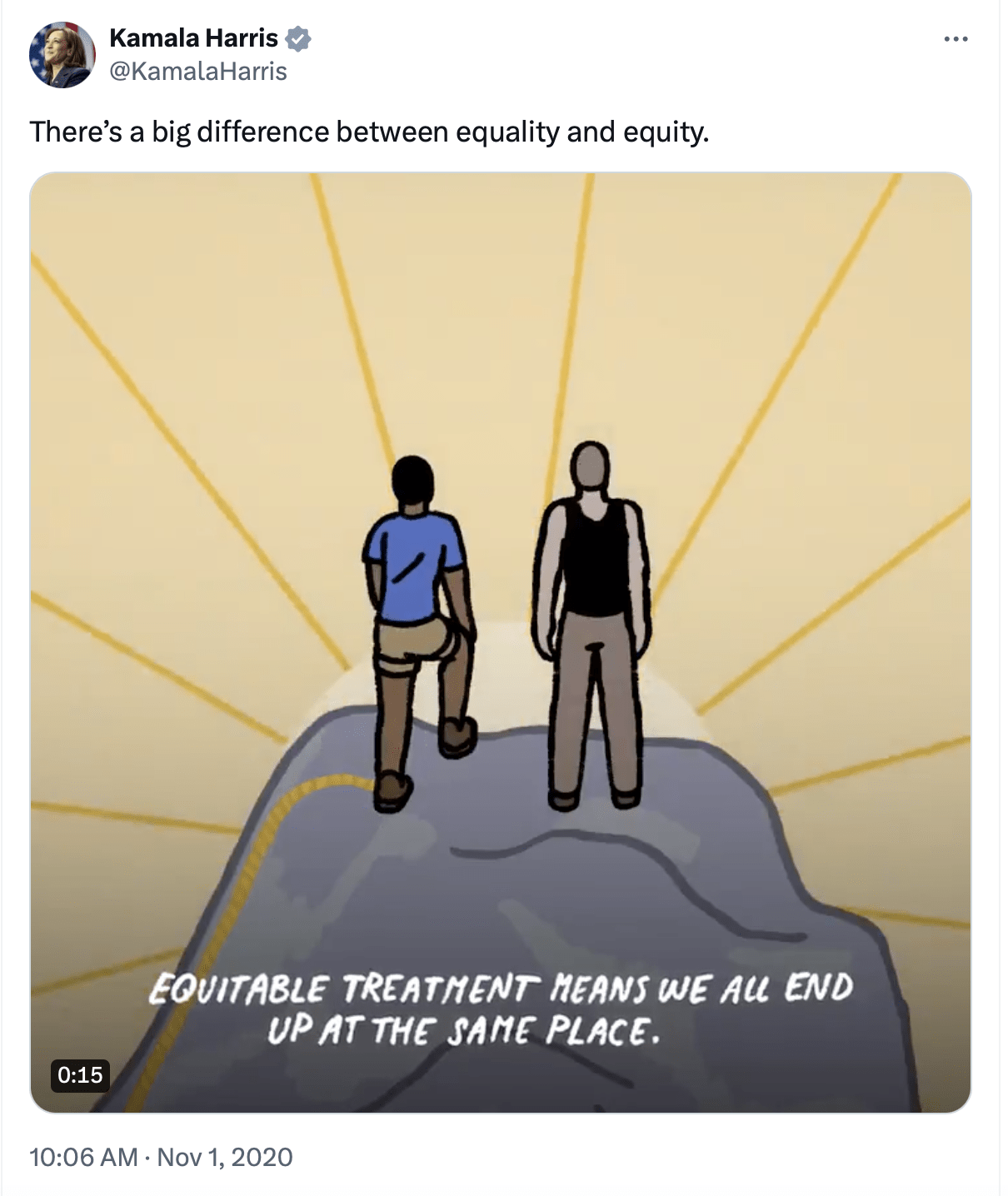
It does Harris too much credit to paint her as an ideologue, but what discernible views she has reflect commitment to the continued HR-ification of American life. “Paging through intelligence reports just weeks after she was sworn in,” the New York Times reports, the new Veep fretted over possible gender bias in the adjectives used, forcing an inquiry that led to “a new training class for analysts on how to judge and assess female foreign leaders.” She demanded “demographic breakdowns on Covid vaccination recipients[,] pressed the administration’s health officials to address gaps,” and “pushed the federal bureaucracy to incorporate concerns about equity into routine business.”
But whether Harris proves an aggressive administrator-in-chief or simply reads what’s on the cards she’s handed, the result will be much the same. “The administrative state is almost wholly an embodiment of progressive values,” two of its leading academic defenders acknowledge: “enacted through the leadership of the Democratic Party to help people in need, regulate business, expand minority rights, tax and spend, and address a broad range of national problems.” It has “a decidedly liberal tilt.”
Indeed, in this cycle, 84 percent of federal employees’ campaign contributions have gone to the Harris-Walz ticket, with an even sharper skew in agencies like the Education Department (100 percent of donations) and the EPA (99 percent). A class of nonpartisan experts, this isn’t: Americans are governed, undemocratically, by a political class well to the left of the median voter—and governed harder when the Blue Team’s in control.
It’s surely not active management from Joe Biden that’s driving continued corruption of science through federal grants; compulsory Kendi-ism via EEOC attacks on fitness tests and criminal background checks in hiring; or spurring the NLRB to tell Starbucks it’s illegal to close certain stores or suggest to a barista “if you’re not happy [here] you can work for another company.” The regulatory state is a machine that goes by itself if nobody’s inclined to throw a spanner in the works. In a Harris-Walz administration, we can expect new heights of bureaucratic excess.
“Existential Threat” to Democracy?
Of course, one has to weigh danger against danger: if I thought there was a serious risk that Trump 2.0 would “overthrow constitutional democracy” or drag the United States toward dictatorship, I too would be ready to greet Harris and Walz as liberators. I don’t, so I’m not.

Elite discourse on this subject has become utterly unhinged: “A Trump dictatorship is increasingly inevitable. We should stop pretending,” Robert Kagan writes in the Washington Post; “If we [journalists] are the ‘enemy within,’ that means we go to the camps too,” fantasizes Vanity Fair’s Molly Jong Fast. “TAKE TRUMP AT HIS WORD,” the New York Times editorial board demands in a four-alarm editorial, blaring in Boomer-uncle ALLCAPs across the full front page of last Sunday’s Opinion section: “DONALD TRUMP SAYS HE WILL PROSECUTE HIS ENEMIES, ORDER MASS DEPORTATIONS…” and so on. Inside, you get a litany of actions Trump also threatened to take in his first term but didn’t, each followed by the red-lettered exhortation: “Believe Him.“ Why, exactly? Because he identifies as an autocrat and deserves affirmation?
What if I told you that Donald Trump is an inveterate blowhard? Before taking him so seriously that you’re “literally shaking” about it, you’re allowed to look at his track record.
If you do, you’ll notice a distinct pattern: very few of 45’s authoritarian fancies—from unilaterally revoking birthright citizenship to “hereby order[ing]” American companies out of China—ever made the transition from idiotic tweet to nefarious plan. As I wrote in Reason toward the end of his term:
In each case, Trump basked in the resulting media frenzy, then did nothing whatsoever to follow through. It always ended up being a more unnerving version of “Dude: Let’s buy Greenland!”
Despite the rhetorical sound and fury, in practice Trump ended up a less imperial president than George W. Bush, Barack Obama, or Joe Biden. Even on COVID-19—a workable excuse for an executive power grab if ever there was one—Trump proved the rare president willing to let a good crisis go to waste. It was his successor who seized on the pandemic as an all-purpose rationalization for rule by decree.
Obviously, it wasn’t self-restraint or constitutional scruple that stayed Trump’s hand. More likely: he has less interest in actually being a dictator than playing one on TV. Seizing vast new powers was never necessary to the performance, and besides, it would have been hard work for somebody lacking in self-discipline and a functional attention span.
The actually existing Trump administration was more “Veep” than “House of Cards”: more Berlusconi than Mussolini. The argument that Trump 2.0 will be radically different rests on the claim that the former POTUS has learned from experience: now he knows the right levers to pull, the right people to appoint to make the infernal machinery work for him.
I don’t buy it. This is a guy who installed John Bolton as National Security Adviser, looking for advice on how to stay out of stupid wars. Now we’re told he’s laser-focused on his mission of vengeance; if so, you’d think he’d have bothered to prepare for the last debate.
Look, I don’t relish the idea of pushing our luck by running this experiment again. I dearly wish the Senate had done its duty and constitutionally disqualified Trump from future office in his second impeachment trial. Even if January 6 wasn’t quite Pearl Harbor meets 9/11, it was still one of the most disgraceful things a president’s done in my lifetime. As various participants in Reason’s recent election symposium note, the 45th president “leveraged unproven fraud claims to attempt a self-coup,” “ginned up a mob of his fans to storm the Capitol building” and therefore “doesn’t deserve to hold office.” I agree.
But that’s not the question here. As I said at the outset, this is an exercise in political threat assessment: “Which of two electoral outcomes libertarians should dread more.” That demands a pragmatic assessment of the relative risks.
With Trump, the true nightmare scenarios typically involve renewed threats to the peaceful transfer of power. The passage of the Electoral Count Act has reduced the risks of another such attempt significantly, by clarifying that the vice president’s vote-counting role is ceremonial, raising the bar to electoral-vote challenges in Congress, and making it harder for rogue actors in the states to manipulate the outcome. Other commentators have floated scenarios in which Trump decides to ignore the 22nd Amendment and go for a third term. He’ll be 82 in 2028, but I suppose it’s possible he’d try—and wildly improbable that he’d succeed. In any event, that lurid scenario is a good deal less likely than the more prosaic threat outlined above: a reenergized administrative state, unburdened by what has been, under a Kamala Harris presidency.
Nor was January 6 the only state-sponsored atrocity of recent years. At the start of this decade, the public health bureaucracy mounted an unprecedented assault on normal life; even after the cavalry arrived in the form of effective vaccines, “young children remained isolated or masked through two years of crucial social development [and] dying grandparents were denied the company of loved ones.” Meanwhile, the Biden-Harris administration used federal power to enforce conformity under the militant, illiberal orthodoxy of “diversity, equity, and inclusion.” What’s more, they carried out a massive, covert effort to suppress core political speech, which one federal court likened to an “Orwellian Ministry of Truth.” The ticket is unrepentant about that and ready to do it again.
In their understandable revulsion towards Donald Trump, some libertarians seem on the verge of convincing themselves that the Blue Team is basically the party of institutionalized niceness. Sure, they’ll overreach at times, but at least they’re not mean: their heart’s in the right place! I take a less benign view of what’s on offer from the party of government: left unchecked, administrative rule promises a tyranny of “omnipotent moral busybodies” who torment us for our own good and without end.
“A grim electoral choice” is right. If the question is, which side deserves to be punished on Tuesday, it seems to me they both do. The good news is, one of them will. Here’s the hopeful case that a Trump loss will be better, in the long run, for limited government, the country, and the Republican Party. Here, though it wasn’t so intended, is the hopeful case that some time spent wandering in the wilderness will lead to a saner Democratic Party.
The bad news, of course, is that the only certain punishment is what’s about to be visited on the country itself.






